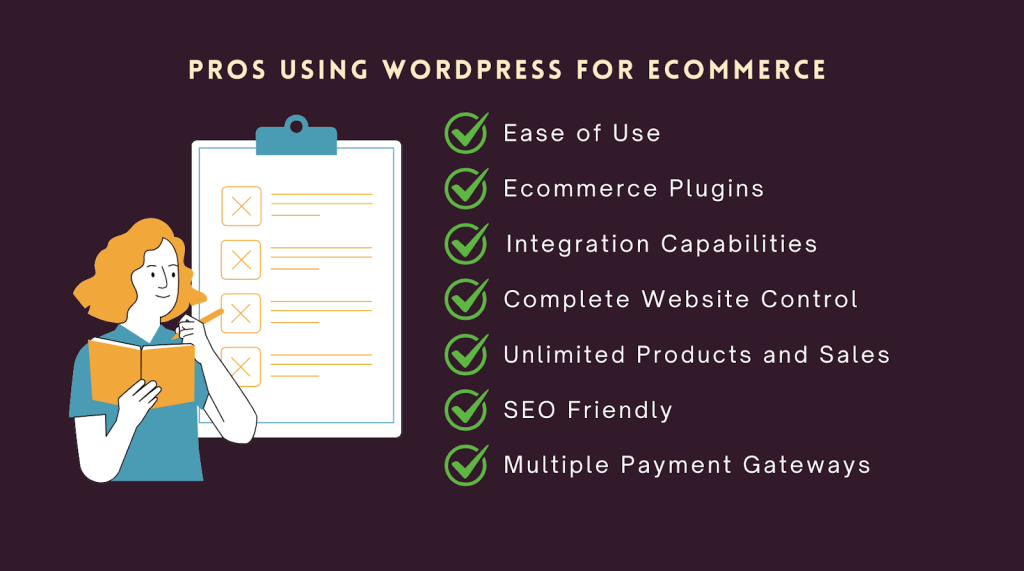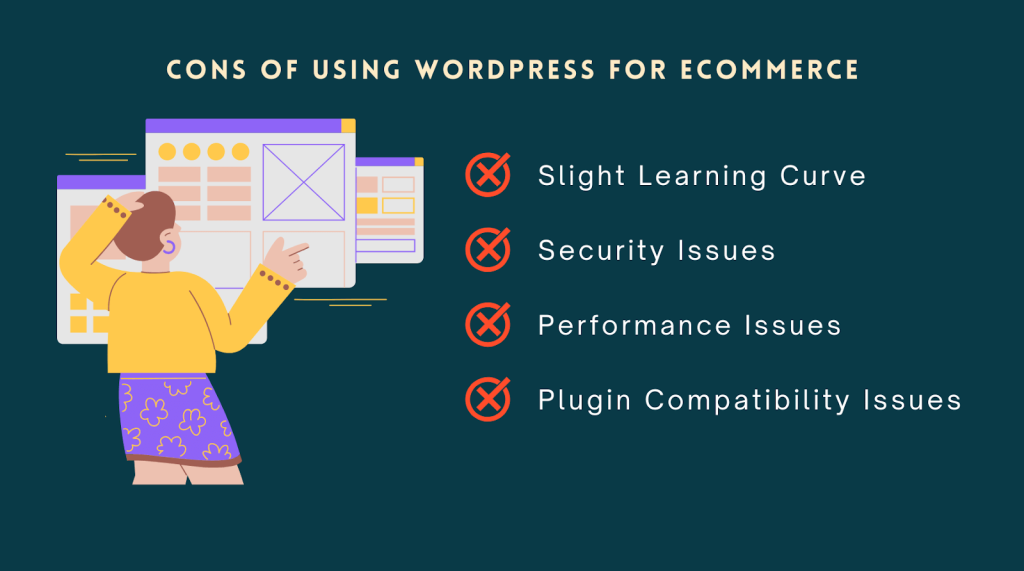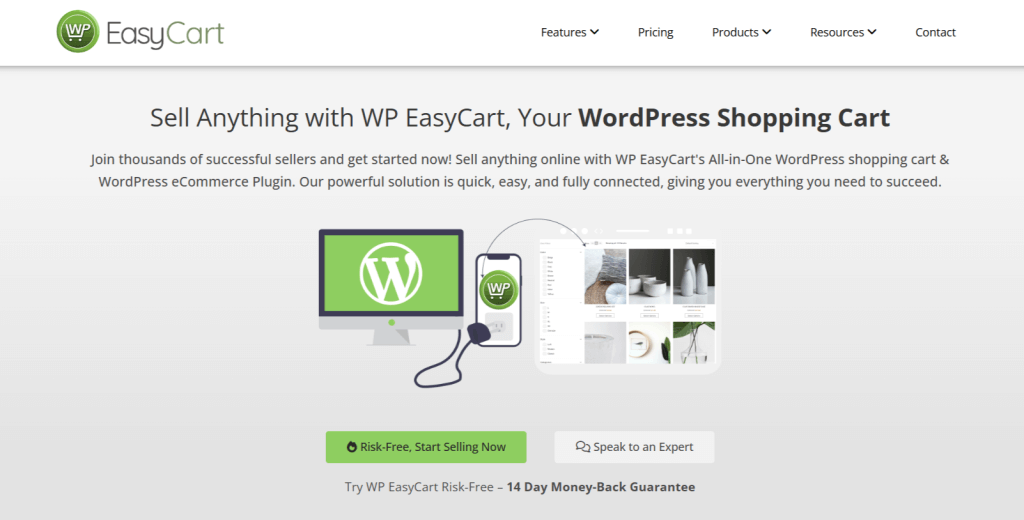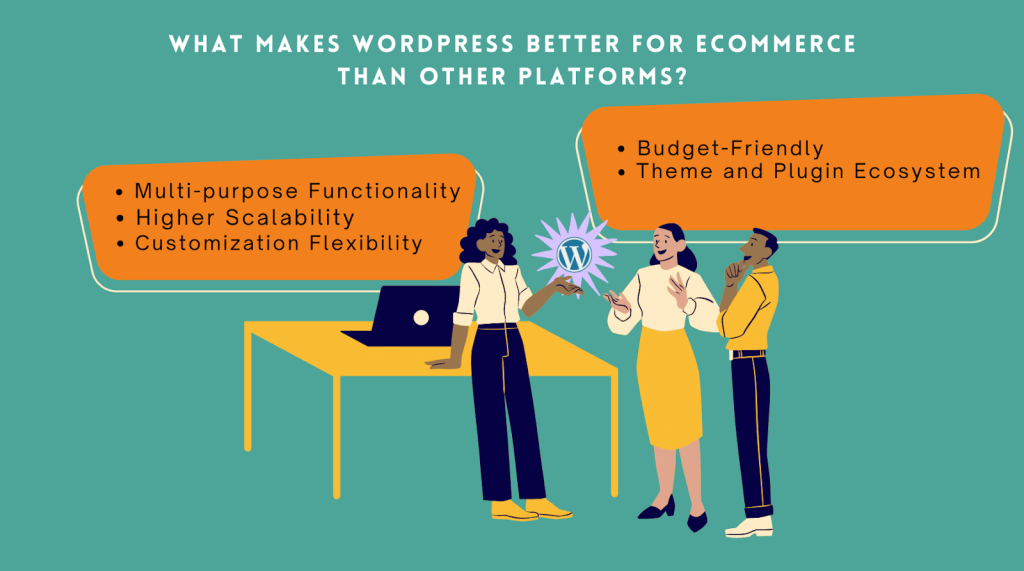Did you know that over 40% of all websites on the internet are powered by WordPress? With its open-source nature and a massive ecosystem of themes and plugins, WordPress has long been the top choice for building websites, which includes ecommerce stores.
If you’re considering WordPress to launch your online business, you’re in the right place! In this blog, we will analyze the ecommerce capabilities of WordPress to answer the age-old question – “Is WordPress good for ecommerce?“.
Stay tuned to learn more and decide if WordPress is the best platform to bring your products to market!
Why Use WordPress for Ecommerce?
WordPress is undoubtedly the most popular platform for building websites and has also become the leading choice for ecommerce stores. It is highly flexible, adaptable, and powerful, making it the perfect platform to launch and manage an online store.
Some of the most compelling reasons to use WordPress for ecommerce are –
- Flexibility and Customization: When it comes to customization, WordPress stands on top with thousands of themes and plugins built to help you create a unique storefront that matches your brand.
- Ease of Use: WordPress is user-friendly and accessible, even for beginners. You don’t need advanced technical skills to set up and manage your online store.
- Powerful Ecommerce Tools: Plugins like EasyCommerce transform WordPress into a fully functional ecommerce solution, providing tools to manage products, orders, payments, shipping, and more.
- Budget-Friendly: WordPress is an open-source platform, so there are no hefty monthly fees for basic functionality, making it a cost-effective option for startups and enterprises.
- SEO-Friendly: WordPress is designed with SEO in mind and with multiple optimization plugins to be integrated, your store can rank better on search engines.
- Marketing Tools: WordPress integrates with various marketing tools, analytics platforms, and CRM systems, making it easier to implement growth strategies and drive sales over time.
- Global Reach: Businesses that target a global audience often prefer WordPress, as it supports multilingual stores, multiple currencies, and international shipping.
- Community Support: WordPress has a massive community of developers, designers, and business owners who provide extensive resources, support, and updates.
Pros Using WordPress for Ecommerce

Now that you know what makes WordPress a good ecommerce platform, let’s also take a look at the bad and weigh them against the good. Here are the pros of using WordPress for ecommerce –
Free to Use
WordPress is an open-source platform, which means it is free to use and doesn’t come with high licensing costs. While there may be costs for hosting, themes, or plugins, the base software is accessible to anyone.
It also has a user-friendly interface that makes managing an ecommerce store straightforward, even for beginners with minimal technical experience.
Range of Ecommerce Plugins
WordPress supports a wide variety of ecommerce plugins, including EasyCommerce, WooCommerce, and Easy Digital Downloads (EDD).
These plugins come with powerful built-in ecommerce functionalities like product and inventory management, shipping and tax calculators, payment processing, and more, which can be seamlessly added to any site.
However, unlike other platforms on WordPress, EasyCommerce has most of the necessary functionalities built-in, so you can start running your store within a few minutes of installing the plugin. This platform also has the capacity to add unlimited products, without ever slowing down; so if you plan to scale your store, you can count on EasyCommerce to get you there!
Integration Capabilities
WordPress effortlessly integrates with numerous third-party tools and platforms, such as marketing software, CRM systems, analytics tools, and social media platforms. These make it quite easy to advance your store’s functionalities and streamline operations.
Complete Website Control
WordPress gives you full control over your website. You own your data, can customize every aspect of your site, and are not restricted by the limitations of proprietary platforms.
Even if a hosting company terminates your account, you can transfer your websites to another hosting company using a backup. Only you will handle all your data, transactions, and payments.
Unlimited Products and Sales
Unlike some platforms that charge based on the size of your store or the number of transactions, WordPress allows you to list unlimited products and process unlimited sales without additional fees.
Small or growing businesses still experimenting with their structure can benefit greatly from this feature.
SEO Friendly
WordPress is inherently designed to be SEO-friendly, with clean code and customizable URLs, making it easier to rank higher in search engine results. Plugins like Yoast SEO and Rank Math provide extra tools to optimize meta tags, keywords, and site performance to drive organic traffic to your store.
Multiple Payment Gateways
WordPress supports integration with numerous payment gateways, including PayPal, Stripe, Square, and many others. This flexibility creates a smoother shopping experience and further globalizes your audience reach.
Cons of Using WordPress for Ecommerce

There are advantages and disadvantages to any platform, and with all the great parts of WordPress comes the bad as well. Let’s look at the cons of using WordPress for ecommerce –
Slight Learning Curve
While WordPress is user-friendly, there is a learning curve, particularly for users unfamiliar with website building or technical management. Setting up and managing plugins, themes, and customizations might require some initial time investment or the help of a developer.
Security Issues
As a widely used platform, WordPress can be a major target for hackers. You can ensure your site’s security with regular updates, strong passwords, and additional plugins or tools for firewalls and malware protection such as WordFence, All-in-One Security (AIOS), Sucuri, and Jetpack.
Security also becomes a concern, as you are fully responsible for it. And while this may sound tricky, WordPress hosting companies provide excellent security measures to protect websites that are hosted on their servers.
Performance Issues
If not optimized properly, WordPress sites can experience slow load times, especially for large ecommerce stores with high traffic or extensive product catalogs. You can employ reliable hosting, caching plugins, and image optimization plugins like ThumbPress to upkeep speed and user experience.
Plugin Compatibility Issues
WordPress relies heavily on plugins for extended functionality. However, not all plugins are compatible with each other or with your theme, which can lead to errors or site crashes. You must test and vet all new plugins and keep them updated to avoid disruptions.
Top 3 Ecommerce Platforms for WordPress
WordPress as a platform is only as good as its best plugin, which is especially applicable to ecommerce. While several ecommerce plugins work great both outside and inside WordPress, there are a few that function exceptionally well.
Here are the three best ecommerce platforms for WordPress you should check out –
1. EasyCommerce

Built using the latest web technology and an API-first approach, EasyCommerce is the ideal plugin to turn your WordPress site into a full-fledged ecommerce store. This plugin has everything you need to streamline your operations, under the same familiar WordPress layout and ecosystem.
Even if you’re a beginner with no prior experience with WordPress, EasyCommerce requires zero coding experience and a minimal learning curve to get started.
Here are some ecommerce benefits of EasyCommerce –
- Flexible Product Management: Sell both physical products and digital downloads, with the ability to create variations such as sizes, colors, or file formats.
- Optimized Database Structure: Product data is stored separately from Posts, Pages, and User data to provide smooth performance, even as your store scales.
- Organized Product Management: Order items, attributes, and pricing are also managed in dedicated tables for better organization and efficiency.
- Streamlined Order Fulfillment: Comprehensive options for managing order statuses, so you can easily track orders from placement to delivery.
- Customizable Product Presentation: Templates and thumbnails can be configured directly from the product page to get a personalized and consistent look.
- User-Friendly Interface: The layout is intuitive and easy to navigate to simplify store management for users of all experience levels.
- Built-In Reporting Tools: Access real-time customer insights, sales analysis, and up-to-date reporting right from your dashboard to make informed business decisions.
2. WooCommerce

When it comes to ecommerce on WordPress, WooCommerce is the first thing that comes to mind. With over six million active installations, WooCommerce is a favorite among small businesses, large enterprises, and everything in between.
Similar to EasyCommerce, it’s highly customizable, beginner-friendly, and offers an extensive library of extensions to add advanced functionality to your store.
Here are some ecommerce benefits of WooCommerce –
- Highly Customizable: With thousands of extensions and themes, you can personalize your store’s appearance and functionality to meet your brand’s needs.
- Scalable for Growth: Whether you’re a small business or a large enterprise, WooCommerce can scale with your business as it grows, accommodating more products and higher traffic.
- Wide Range of Payment Options: WooCommerce supports popular payment gateways like PayPal, Stripe, and Square to ensure your customers can pay easily and securely.
- Advanced SEO Capabilities: Built to work with WordPress’s SEO-friendly architecture, WooCommerce helps your products rank higher in search engines.
3. WP EasyCart

WP EasyCart is a WordPress plugin that lets users quickly add ecommerce functionality to their websites. With a focus on simplicity and affordability, it’s an ideal choice for those who want to launch an online store without navigating the complexities of more advanced platforms.
WP EasyCart supports a range of ecommerce needs, including selling physical goods, digital downloads, services, and even memberships.
Here are some ecommerce benefits of WP EasyCart –
- Quick and Easy Setup: WP EasyCart is designed for ease of use, with intuitive installation and configuration steps that don’t require advanced technical knowledge.
- Built-in Marketing Tools: Includes features like abandoned cart recovery, discounts, and coupon codes to help boost sales.
- Payment Gateway Integrations: WP EasyCart supports major payment processors, including PayPal, Stripe, Square, and more.
- Multi-channel Sales Support: Sell products directly through your website while also integrating with platforms like Facebook and Instagram for a broader reach.
What Makes WordPress Better for Ecommerce Than Other Platforms?

While it’s a close competition with the top ecommerce platforms, WordPress can outperform them in terms of flexibility, cost-efficiency, and availability. So, to answer the question – Is WordPress good for ecommerce; let’s look at why it’s better than other ecommerce platforms available.
- Customization Flexibility
WordPress allows you to create a completely custom ecommerce experience, unlike hosted platforms like Shopify, BigCommerce, or Wix, which can limit your design or customization potential.
- Budget-Friendly
While other platforms charge recurring subscription fees, WordPress itself is free, and many plugins also offer free versions. You can also choose your hosting provider to control your budget better.
- Higher Scalability
With the right hosting and plugins, WordPress can grow with your business to handle thousands of products and high sales volumes without performance issues. WordPress accommodates everything from small stores to large, high-traffic ecommerce sites.
- Theme and Plugin Ecosystem
With an extensive library of themes and plugins, you can easily integrate advanced SEO tools, marketing automation, and analytics plugins to optimize your online store.
- Multi-purpose Functionality
Unlike standalone ecommerce platforms, WordPress allows you to build more than just a store—you can create blogs, forums, or even online courses alongside your ecommerce site.
Wrapping Up
WordPress, while a versatile platform for a range of websites, might not be the best choice for complex ecommerce stores with extensive product catalogs, and intricate inventory management.
However, if you’re just starting with zero coding experience and a smaller business, and are looking for a straightforward solution, WordPress can be a viable option, especially when paired with user-friendly plugins like EasyCommerce.
Ultimately, the answer to – “Is WordPress good for ecommerce?” depends on your specific needs, budget, and technical expertise. Before you jump in head-first, remember to consider all of these factors to make an informed decision that aligns with your long-term business goals.
Frequently Asked Questions (FAQs)
Q. Is WordPress good for an ecommerce site?
A. Yes, WordPress is great for ecommerce, especially with plugins like EasyCommerce. It offers flexibility, scalability, and a wide range of customization options.
Q. Is WordPress better than Shopify?
A. It depends on your needs. WordPress is highly customizable and budget-friendly but requires more setup. Shopify is easier to use, offers built-in features, and is more focused on ecommerce, but comes with a monthly fee.
Q. Can I use WordPress to sell products?
A. Yes, you can sell products using WordPress by installing EasyCommerce, a powerful and flexible plugin that turns your site into a fully functional online store.
Q. What is the cheapest ecommerce platform?
A. The cheapest ecommerce platform depends on your needs, but EasyCommerce (for WordPress) is often the most cost-effective option, especially if you’re comfortable with some setup and customization.

